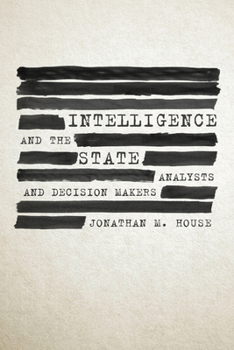Intelligence and the State: Analysts and Decision Makers
In the eighty years since Pearl Harbor, the United States has developed a professional intelligence community that is far more effective than most people acknowledge--in part because only intelligence failures see the light of day, while successful collection and analysis remain secret for decades. Intelligence and the State explores the relationship between the community tasked to research and assess intelligence and the national decision makers it serves. The book argues that in order to accept intelligence as a profession, it must be viewed as a non-partisan resource to assist key players in understanding foreign societies and leaders. Those who review these classified findings are sometimes so invested in their preferred policy outcomes that they refuse to accept information that conflicts with preconceived notions. Rather than demanding that intelligence evaluations conform to administration policies, a wise executive should welcome a source of information that has not "drunk the Kool-Aid" by supporting a specific policy decision. Jonathan M. House offers a brief overview of the nature of national intelligence, and especially of the potential for misperception and misunderstanding on the part of executives and analysts. Furthermore, House examines the rise of intelligence organizations first in Europe and then in the United States. In those regions fear of domestic subversion and radicalism drove the need for foreign surveillance. This perception of a domestic threat tempted policy makers and intelligence officers alike to engage in covert action and other policy-based, partisan activities that colored their understanding of their adversaries. Such biases go far to explain the inability of Nazi Germany and the Soviet Union to predict and deal effectively with their opponents. The development of American agencies and their efforts differed to some degree from these European precedents but experienced some of the same problems as the Europeans, especially during the early decades of the Cold War. By now, however, the intelligence community has become a stable and effective part of the national security structure. House concludes with a historical examination of familiar instances in which intelligence allegedly failed to warn national leaders of looming attacks, ranging from the 1941 German invasion of the USSR to the Arab surprise attack on Israel in 1973.
Format:Hardcover
Language:English
ISBN:168247772X
ISBN13:9781682477724
Release Date:April 2022
Publisher:Naval Institute Press
Length:248 Pages
Weight:1.10 lbs.
Dimensions:0.9" x 5.9" x 9.1"
Customer Reviews
0 rating





